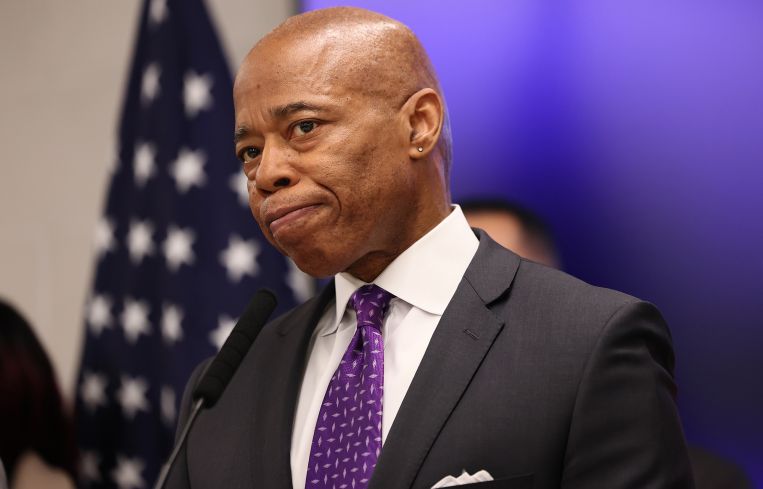Sunday Summary: The Mayoral Race Gets Upended. … Right?
By The Editors October 5, 2025 9:00 am
reprints
A couple of hours after last week’s Sunday Summary reached your inbox, we were hit with a bombshell.
Eric Adams had dropped his re-election campaign for mayor of New York City.
While the move might have been surprising given how late we are in the election calendar, it was an eminently reasonable decision. The former Democrat — who didn’t even participate in his party’s primary — was mounting an independent candidacy and had sunk to fourth in the polls behind the favorite, Zohran Mamdani, former Gov. Andrew Cuomo (also running as an independent), and the Republican Curtis Sliwa.
In the wake of this news, the question now is: Can the anti-Mamdani opposition coalesce around Cuomo?
The answer: Probably not.
While it would be difficult to say that there was zero chance of a Cuomo victory, it would mean complete consolidation. A September Marist poll had Mamdani at 45 percent and Cuomo at 24 percent. To get to 50 percent, it would mean Cuomo swallowing all of Sliwa’s support (17 percent) and Adams’s (9 percent).
However, there are two things to consider in this scenario. Even if Sliwa dropped out tomorrow, his name (along with Adams’s) will remain on the ballot, which could have a measurable effect on a close race.
Second, we’re talking about Curtis Sliwa here.
He has not given any indication whatsoever that he’s eager to forgo the spotlight. “Curtis, up to this point, has been immune to pressure,” said political consultant Jordan Barowitz. “He is a unique character, and doesn’t really owe anything to anyone.”
Believe it or not, Adams dropping from the race was arguably not the biggest piece of political news (or, rather, policy news) affecting Gotham last week. It was actually the $18 billion in infrastructure funds the U.S. Department of Transportation suddenly decided to withhold.
How come? Because several of the projects awarded contracts by prioritizing Disadvantaged Business Enterprises (DBE) or Minority- and Women-Owned Business Enterprises (MWBE), which the Trump administration claims is itself a form of discrimination.
We’ll see how the administration’s decision holds up. (The administration suffered a setback when the U.S. Supreme Court said they wouldn’t hear their case for firing Fed Governor Lisa Cook until January.)
Not one, not two or even three — but FOUR monsters
Monster leases, that is.
In this day and age, anything above 100,000 square feet qualifies as a monster — and Manhattan got four of ’em good and scary in the last week.
First up, Richemont — the Swiss luxury parent of Cartier, Van Cleef & Arpels and Buccellati — took a massive 138,485 square feet at 645 Fifth Avenue, which is serving as Richemont’s North American headquarters.
A few blocks southwest, Versant (which is Comcast’s corporate cable channel spinoff) plugged into 164,545 square feet of temporary space at 229 West 43rd Street (the former home of The New York Times).
Go a little farther south and you discover that BlackRock tacked on 193,573 square feet to its space at 50 Hudson Yards. (Which brings its total at the complex to 1.2 million square feet!)
But the piece de resistance was Guggenheim Partners’ renewal (240,000 square feet) and expansion (up to 360,000 square feet) at 330 Madison Avenue.
Take that, once-sleepy office market!
And, if the leases don’t convince you NYC is back, there were some pretty flashy sales, too. For instance, Ikea bought the Nike flagship store at 529 Broadway from Wharton Properties, A&H Acquisitions, Aurora Capital Associates and Thor Equities for $213 million.
Plus, 1334 York Avenue (home of Sotheby’s auction house) was sold to Weill Cornell medical school for $510 million. (No wonder those hospital bills are so outrageous!)
Speaking of Thor…
At least Joe Sitt could be pleased with the sale of his SoHo property, because he got the bad news that Thor was out of the running for one of the three downstate casino licenses.
Indeed, we got more clarity this week on likely winners of the licenses.
Bally’s proposed casino in the Bronx got the go-ahead to advance from the Community Advisory Committee (CAC) stage last Monday. And, while nothing can make up for the Mets’ inexplicable implosion in the 2025 MLB season, Steve Cohen can at least take some comfort in the fact that he’s still in the running for a casino license: The CAC voted to send his Metropolitan Park proposal to the New York State Gaming Commission.
Beyond New York
Actually, it was a big week for sales and finances throughout the gateway markets last week.
In South Florida, the Carlyle Group put together a $513 million financing package for Newgard Group and Two Roads Development’s two-tower condo project called One Brickell Riverfront.
On the Miami River, Valeris Capital is sinking $108.4 million into the 342-unit Remi on the River from Mast Capital and AEW.
In Los Angeles, Hines Global Income Trust dropped $428.1 million for the 14-acre, mixed-use luxury residential and retail complex Runway Playa Vista from Invesco Real Estate, making it one of the priciest Southern California deals of the year.
In San Diego, Elevation Land Company and a fund advised by Crow Holdings Capital was financed to the tune of $102.4 million to purchase the first phase of the 119-acre warehouse and distribution center Otay Business Park in Otay Mesa.
But if you thought that was good, check this out: Aware Super, one of Australia’s largest pension fund managers, and Goodman Group just spent (checks notes) $1.3 billion on 2.8 million square feet of logistics real estate in Southern California.
All of this money floating around should get you in a good frame of mind to read about one of the heavy-hitters of finance: Larry Kravetz.
Kravetz is one of the most hallowed names in CRE. He talked about his new perch at Nomura, how he got started in commercial mortgage-backed securities and much more in last week’s cover story.
In memoriam
It was a sad week for the folks at Fortress Investment Group.
One of the bright stars of the business, Joshua Pack, co-CEO and managing partner, died at the young age of 51 from unknown causes.
“We are devastated by this loss,” Fortress said in a statement last Monday. “Josh was a gifted investor, a thoughtful strategist, a compassionate leader — and a deeply cherished friend to many. A member of the Fortress family for over 23 years, Josh left an indelible mark on our institution. He cared deeply for his team, and that care was returned in kind.”
We’ll leave it at that. See you next week.



